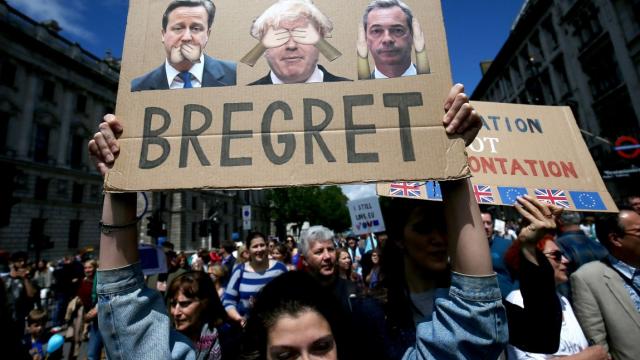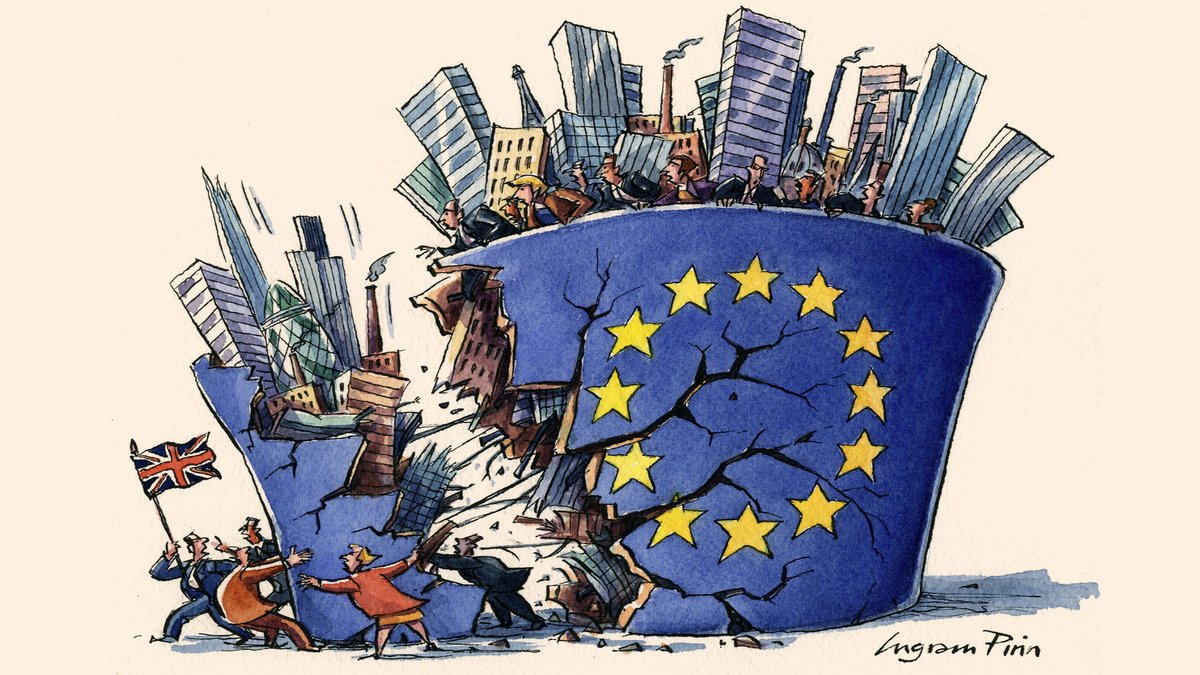
With the world transfixed on the bedlam unravelling in the House of Commons – as headteachers urge Brexit-bickering MPs to stop their heated disagreements and start setting a "positive example" to children, and anti-Brexit protestors camp out on the curbs of the Houses of Parliament hurling hostile remarks while reports get broadcast live across the globe – it’s safe to say Britain’s former reputation for self-restraint, diplomacy and pragmatism has been abolished.
Instead of an exemplar of self-control, rationality and realism, Britain has become a self-imposed nation of chaos led by a government too inept to govern as citizen disunion and contempt rise with each passing day.
Nobody told those who ticked the "Leave" box on the ballot cards on June 23, 2016, that things would turn out like this.
Granted, the hard-line Brexiteers – the Nigel Farages and Boris Johnsons of the world along with their army of uncompromising Brexit followers – would rather see Britain slump further into turmoil than surrender to pro-Europeans and stay within the E.U. bolthole.
But for the 17.4 million who voted overall to Leave, equating to just shy of 52% of the electorate, a large chunk was considerably more indecisive about their vote. Many were convinced by the con promising £350 million a week for the National Health Service – a promised return which, like most investments that look too good to be true, was just that. In fact, the £350 million promise turned out to be a devious, bogus scam that duped millions into collectively bringing the country to its knees.
For this segment of voters, many are justifiably feeling Bregret, a sentiment reflected by a series of polls taken in recent months. One study, released several months ago by U.K. in a Changing Europe and NatCen, found that 59% of voters would now vote to remain in the bloc versus 41% who would choose to leave.
A similar poll, compiled by YouGov in January, showed a clear nine-point majority for Remain if a second referendum were held today. And further evidence of brewing Bregret was seen at the sprawling "Put It To The People’s Vote" march that took place in London late last month.
At that event, hundreds of thousands of people amassed in Central London to call for a second referendum, waving banners demanding "Tories Out Now" and "Stop Brexit and Save the NHS," before rallying in front of Parliament.
The sheer volume of protesters in attendance put the march on a par with the biggest protest march of the century in the U.K.: the Stop The War demonstration in 2003. Amid the crowd was Remainer Now, a group dedicated to giving a voice to those who voted leave in the 2016 Referendum and have now changed their minds and are supportive of a People’s Vote on Brexit.
Such is the deep-rooted regret over voting to leave that this grassroots organization is managing a crowdfunding campaign to raise £35,000, which will go into key constituencies around the U.K. to work with local groups that are showing they have since changed their position – from agreeing with leaving the E.U., to supporting remaining in the bloc.
Clear evidence points to the fact that, armed with greater knowledge about what "Brexit means Brexit" really means, the British public are becoming increasingly anti-Brexit. Nevertheless, Prime Minister Theresa May is obstinately refusing to allow the public to revisit the vote.
Yet now that the people of Britain are better informed about what Brexit is likely to entail, to ignore an informed public’s wishes is damaging to the very core of democracy, and at the expense of the country and its future.
Noting how even Leavers are getting tired of having their original vote respected by those in power, Remainer Now writes:
“We think that only the 'will of the people' can overrule the 'will of the people' and our growing Remainer Now family are fed up of having their 'vote respected' by people in power who won't listen. Please help us get them heard.”
Stuart Smith, a pensioner living in Cheadle Hulme, an affluent suburb of South Manchester, is one Leave voter who regrets his decision.
“If a second referendum was called tomorrow, I would definitely vote to remain,” Smith told Occupy.com. “Not only has [May] made a pig’s ear of exiting, but shares have plummeted in the wake of the vote. I would 100% revoke Article 50 for the sake of the economy.”
Further testament to the growing discontent over the Leave decision is seen in the recent U.K. Government and Parliament petition being enthusiastically shared by the public. The petition, which calls for the government to revoke Article 50 and put a stop to claims that exiting the E.U. constitutes "the will of the people," has garnered a staggering 6,062,020 signatures and counting.
In fact, revoking Article 50 is now clearly the preferred way out of the Brexit mess, as shown by the hundreds of thousands who gathered on London’s streets to join in the Put It To The People’s Vote protest last month.
And it’s not only the public that is recognizing why doing a U-turn on the original vote – by holding a second referendum – is the only viable solution to salvaging the Brexit chaos. A growing number of MPs also believe that a revocation might be the only way to avoid a no-deal situation.
On March 27, 268 MPs backed a new public vote, with 295 opposing, meaning 47.7% are currently in favor of a second referendum – more than there are in favor of May’s beleaguered deal, which has already been brought to the House of Commons, and failed, three times.
What was largely dismissed by MPs since the 2016 referendum now looks to be a genuine, much-needed solution. Among those now committed to a second referendum is Labour party leader Jeremy Corbyn, who spent last week locked in Brexit crisis talks with the prime minister. As they seek to break the deadlock, both May and Corbyn are being urged by their own MPs, as well as by business leaders and retired Civil Service chiefs, to deliver a second vote.
As the Brexit stalemate drags on, it seems the only plausible, viable and real option may be to bring the vote back to the people and let the Bregretters have their chance to reconcile what can only be descried as a monumental British flop.














